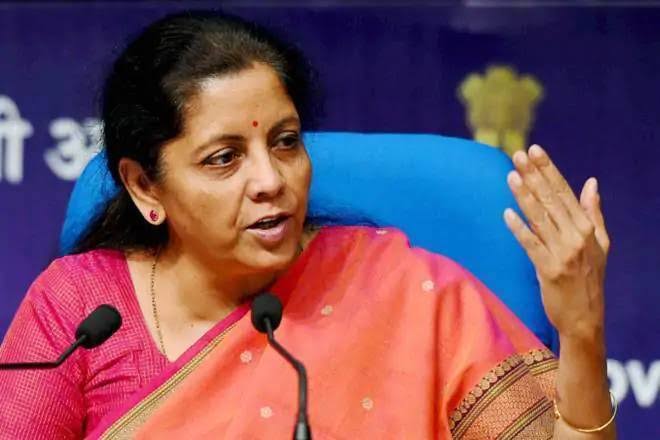BUDGET 2021-22
“We are all reminded time and again that our fight against Covid-19 continues in to 2021. Now, just as it had happened after the two World Wars, there are signs that the political, economic and strategic relations in the post- Covid world are changing. This moment in history is the dawn of a new era-one in which India is well poised to truly be the land of promise and hope”.
Union Finance Minister Nirmala Sitharaman presented the first ever digital Budget for 2021-22 on 1 February, 2021.
Though there was no direct relief for the middle class, the Finance Minister set aside Rs 35,000 crore for the Covid-19 vaccination programme and the overall outlay for Health and Well-being was given Rs 2.23 lakh crore, keeping a 137% rise over last financial year.
The Finance Minister is hopeful of betting on a real GDP growth rate of 10 to 10.5 per cent in the coming financial year and also hopes to ride on the multiplier effect of infrastructure spending that would spur demand and job creation in the country.
Aatma Nirbhar Swasth Bharat Yojana, a new scheme will be launched with a total outlay of Rs. 64,180 crore over six years in the country. This will be in addition to the National Health Mission. The Scheme includes setting up of integrated public health labs in all districts and 3382 block public health units in 11 states.
The Jal Jeevan Mission (Urban) will be launched with an outlay of Rs 287000 crore for providing 2.886 crore household tap connections and liquid waste management in 500 AMRUT Cities in the country.
To achieve the goal of making India a 5- trillion dollar economy, the government will provide Rs 1.97 lakh crore over five years for the Production Linked Incentive (PLI) Scheme to boost domestic manufacturing.
In the Infrastructure sector the budget has proposed establishing a Development Financial Institution with a goal to lend at least Rs 5 lakh crore in three years period.
In the Insurance sector, foreign direct investment limit will be increased to 74% from the existing 49% and a “bare minimum”public sector enterprises will be retained even in strategic sectors.
BPCL, IDBI Bank, two more public sector banks and a general insurance company will be put on sale as a new strategy of disinvestment.
However, Rs 20,000 crore has been earmarked for recapitalisation of banks and taking over the bad loans of public sector banks to reduce the rising NPA.
Seven major ports worth Rs 2,000 crore will be privatised in the financial year 2021-22.
Rs 1,08,230 crore has been earmarked for Road Transport and Highways in the country for the year 2021-22.
Under the Bharatmala Project, more than 13,000 km of roads had been completed and another 8500 km would be constructed during the next financial year. The government also announced National Highway projects for states of Tamil Nadu, Kerala, West Bengal and Assam where elections are scheduled.
In Kerala, Highway of 1100 km would be constructed at an outlay of Rs 6500 crore, including the Mumbai-Kanyakumari corridor.
The Budget proposed to set up 100 Sainik Schools in partnership with NGOs, private schools and State-owned schools with an aim of preparing children academically, physically and mentally for entry into the National Defence Academy.
Higher Education Commission of India would be set up for accreditation, regulation and standard setting in the education sector in the country.
The allocation to micro, small and medium enterprises (MSME) has been doubled to Rs 15,700 crore for the next financial year to revive the MSME as a measure to rejuvenate the economy during the pandemic.
The reduction in customs duties on steel and ferrous scrap will help bring down the prices of the raw materials in the sector.
Government announced a voluntary Vehicle Scrappage Policy to phase out old and unfit vehicles in the country. All vehicles would undergo fitness tests after 20 years in automated fitness centres in the case of personal vehicles and after 15 years in the case of commercial vehicles. This will help in encouraging fuel-efficiency and environment friendly vehicles reducing vehicular pollution and saving energy to a great extent.
In order to improve agricultural infrastructure, the Finance Minister announced an Agriculture Infrastructure and Development Cess (AIDC) on select items such as petrol, diesel, apples and alcohol.
This will not lead to any additional burden on the consumers as the basic Customs Duty rates have been reduced on most items where the cess is being imposed.
It is also proposed a record allocation of Rs 1.07 lakh crore for Indian Railways for the next financial year and the funds would be utilised to boost ‘Atmanirbhar Bharat Mission’ towards the completion of infrastructure projects, capacity building passenger amenities and safety.
Budget proposed taxing the income on Provident Fund contributions of more than Rs 2.5 lakh a year by the employees.
Also in Unit-linked insurance plans (ULIP), the maturity benefits accruing from premium payments of more than Rs 2.5 lakh a year will be subjected to capital gains tax.
Senior citizens aged 75 years and above need not file Income Tax Returns if their earnings are from pension and interests.
The extra benefit towards annual loan interest payment for affordable housing has been extended till 31 March, 2022.
Capital gains exemption for investment in start-ups extended till 31 March, 2022.
For foreign portfolio investors, deduction of tax on dividend income will be at a lower treaty rate.
Also the infrastructure debt funds are eligible to raise money by issuing tax-efficient zero-coupon bonds.
The stock markets cheered as the Finance Minister announced various schemes in sectors like healthcare, auto, infrastructure and agriculture. The absence of any increase in wealth tax and long-term capital gains on equity, any additional taxes or surcharges kept the market a huge relief and helped to sustain the buoyant sentiments.
It is also announced setting up of a Single Security Market Code by consolidating the provisions of SEBI Act, 1992, Depositories Act, 1996, Securities Contracts (Regulations) Act, 1956 and Government Securities Act, 2007. This will improve ease of doing business in the financial markets and will instil confidence among participants in the market.
It is also proposed to create a permanent institution that would intervene both in stressed and normal times and help in the development of the financial market in the country.
The government also announced establishing a system of regulated gold exchanges in the country.
Public expectation towards the Budget 2021-22 has been extraordinarily high during this pandemic period.


